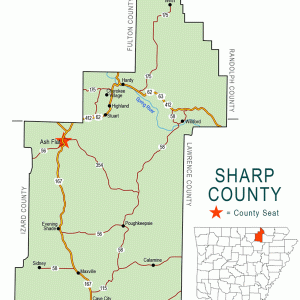calsfoundation@cals.org
Wirth (Sharp County)
Wirth is a small, isolated community located on an approximately fifteen-mile-long north-south plateau rising from the Spring River in northern Sharp County. At its peak, the community was a commercial and social center that attracted a number of German settlers.
The first non–Native American settlers to the area may have come as early as the 1700s, with one source reporting a Spanish family by the name of Munz settling there. More likely, the first to settle were Buck Baldridge and Dee Arnold, who established themselves by 1848.
No significant settlement occurred until the 1880s, when a substantial number of German immigrants were enticed to move to the area. Apparently, many people read glowing accounts published by railroad companies in German-language newspapers. These advertising campaigns attracted large numbers of settlers. One such settler was Edward B. Wirth, who, in 1883, migrated with his family from Pennsylvania; it is believed that the community was later named after him. Others soon followed, including many from England, Scotland, Ireland, France, and Italy. Still, the largest ethnic group was German, making up approximately sixty percent of the population at one time.
A small town with a decidedly German flavor soon developed. Most of the settlers earned a living as farmers, cultivating cotton that was hauled by wagon to the nearby towns of Hardy (Sharp County), Mammoth Spring (Fulton County), and Thayer, Missouri. Cutting timber for the manufacture of railroad ties was also a profitable venture for many. Some engaged in zinc mining in the 1890s. There were also reports of small silver-mining operations in the area.
In 1888, William and Martha Rikard deeded one acre of land on the western edge of the community for the construction of a school. A simple frame building opened its doors in 1890 for students of grades one through eight. For much of its existence, the school reported an average daily attendance of approximately sixty students. When the school was consolidated with Williford (Sharp County) in 1949, the building was occupied by the Protestant congregation. There was also a Lutheran church with services conducted in German. Just east of the town was a non-denominational church mainly attended by area Methodist and Presbyterian converts.
The first business was a general store opened by John Stark in about 1890. A post office, which was originally named Flatwoods, opened in 1892. Other businesses were soon opened by Dee Arnold, George Meltzer, and Paul Schuster. During its heyday, approximately the first twenty-five years of the twentieth century, Wirth was home to five stores, two blacksmith shops, a post office, a barber shop, a grist mill, and a sawmill.
The community drew large crowds for town baseball games, political campaign speeches, and such holidays as Independence Day. A twelve-member town band, which was organized in about 1912, was a favorite at many of these social gatherings. The fiftieth wedding anniversary of Edward B. Wirth and his wife was a major celebration.
By the 1930s, with the improvements in transportation and economic opportunities elsewhere, people began to move to the nearby towns of Hardy, Mammoth Spring, and Williford. Many who remained gave up cotton farming and turned to cattle. Though called one of Sharp County’s principal villages in 1947, the decline hastened with the closure of the school in 1949. The post office had closed years before in 1918. In the twenty-first century, the town is located at the end of State Highway 175, the only paved road connecting to the town. All that remains is the church building, a cemetery, and a few residences.
For additional information:
Alveshire, Budd. History of Wirth, Arkansas. N.p.: n.d.
A History of One-Room Schoolhouses of Sharp County: Country School Memories. Mount Vernon, IN: Windmill Publications, 1993.
Mike Polston
CALS Encyclopedia of Arkansas
 Sharp County Map
Sharp County Map 




Comments
No comments on this entry yet.